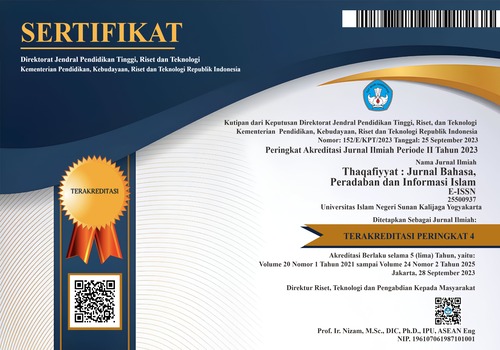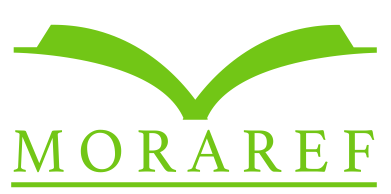BERTAHAN DI TENGAH PERGULATAN ZAMAN (Kajian Sejarah Sosial-Ekonomi Komunitas Keturunan Hadrami di Yogyakarta Abad Ke-20)
DOI:
https://doi.org/10.14421/thaq.2012.%25xAbstract
The community development of the Hadrami (jamaah) in Yogyakarta in the 20th was not separated from the life construction of the former Hadrami generation. All social process and experiences have influenced their point of view and dynamism going on the community social life in Yogyakarta. In social context, the Hadrami generation of Yogyakarta who were born in the early 20th century has been the "becoming Java" generation or even have never "been Arab" before. The nature surrounded by Javanese culture values and the nurture under the care of a noble- family mother tended to make the Arab descendant to know the mother's culture rather than the father's. This contribution that caused much identity disorientation or dilemma experienced by lots of Hadrami in Yogyakarta. The phenomenon appears when the interaction process is going on with the Arab new comers from other cities starting in 1940's. Besides that, they also gave the contribution in birth of economic activities among the Hadrami of Yogyakarta.
The existence of Arab community in Yogya is also influenced by symbols belonged to the community in the middle of the Yogya society. Besides that, the division of history into period to reveal the existence of jamaah is in fact very decisive in coloring the life dynamism and change in the community. Therefore, the two period’s phases consisting of the arrival period and the social-economic condition period are expected to be able to interpret the reality of the change process happening and survival forms to the Hadrami people in Yogyakarta in the 20th century.
Downloads
References
Affandi, Bisri, Syaikh Ahmad Surkati (1874-1943) Pembaharu dan Pemurni Islam di Indonesia, Jakarta: Pustaka Al-Kautsar, 1999.
Algadri, Hamid, C.Snouck Hurgronye: Politik Belanda terhadap Islam dan Keturunan Arab, Jakarta: Sinar Harapan, 1984.
Azra, Azymuardi, Jaringan Ulama Timur Tengah dan Kepulauan Nusantara abad XVII dan XVIII: Melacak akar-akar pembaharuan Pemikiran Islam di Indonesia, Bandung: Mizan, 1995.
, Islam Nusantara: Jaringan Global dan Lokal, Jakarta: Mizan, 2002.
Barker, Chris, Cultural Studies: Teori dan Praktek, Yogyakarta: Bentang, 2000. Baswedan, Abdul Rahman, Sumpah Pemuda Indonesia Keturunan Arab (1934), Surabaya: Pers Nasional, 1974.
Berg, LWC. van den, Hadramaut dan Koloni Arab di Nusantara, Jakarta: INIS, 1989. Chalifah, Geisz. Esai-esai Pergeseran Budaya Arab: Abah Seolah Penguasa Ummi
Yang Berkuasa, Jakarta: Khatulistiwa Press, 2008.
Gottschalk, Lois. Mengerti Sejarah, terj. Nugroho Susanto, Jakarta: Universitas Indonesia Press, 1986.
Kartodirdjo, Sartono, Pendekatan Ilmu Sosial dalam Metodologi Sejarah, Jakarta: Gramedia, 1993
Kesheh, Natalie Mobini, Hadrami Awakening, Community and Identity in the Netherlands East Indies, 1900-1942, New York: Southeast Asia Program, 1999.
Kuntowijoyo, Metodologi Sejarah, Ed. Kedua, Yogyakarta: Tiara Wacana, 2003. Lombard, Denys. Nusa Jawa: Silang Budaya Jaringan Asia, Jakarta: Gramedia Pustakautama, 1996.
Nakamura, Mitsuo, Bulan Sabit Muncul dari Balik Pohon Beringin: Studi Tentang Pergerakan Muhammadiyah di Kotagede, Yogyakarta, Yogyakarta: Universitas Gajah Mada Press, 1983.
Nordholt, Henk Schulte. Kriminalitas, Modernitas dan Identitas dalam Sejarah Indonesia. Yogyakarta: Pustaka Pelajar, 2002.
Pijper, G.F. Beberapa Studi Tentang Sejarah Islam di Indonesia 1900-1950. Jakarta: Universitas Indonesia Press, 1985.
Raffles,Thomas Stamford. The History of Java. Yogyakarta: Narasi, 2008. Soemardjan, Selo, Perubahan Sosial di Yogyakarta, Yogyakarta: Gajah Mada
University Press, 1981.
Soekanto, Soerjono, Sosiologi Suatu Pengantar, Jakarta: Raja GrafindoPersada, 2000.
Suratmin, Abdur Rachman Baswedan: Karya dan Pengabdiannya. Yogyakarta: Departemen Pendidikan dan Kebudayaan Direktorat Sejarah dan Nilai Tradisional Proyek Inventarisasi dan Dokumentasi Sejarah Nasional, 1989.
Wahid, Abdul, “Proses Menjadi (Tidak) Indonesia? Persepsi dan Memori Massa- Rakyat Tionghoa di Yogyakarta”, dalam Identitas Poskolonial di Indonesia, Yogyakarta: Kanisius, 2003.
Warto, “Mengembangkan Sejarah Sosial-Ekonomi Alternatif”, dalam Diakronik, Vol. 1, No. 5 Juli 2004:19-32.
Woodward, Mark W, Islam Jawa: Kesalehan Normatif Versus Kebatinan, Yogyakarta: LKis, 1999.
Majalah Tempo edisi 43/XXXVII, 15 Desember 2008. Panji Masyarakat No.165 tahun 1974.
Prisma, 8 Agustus 1976.
Suara Merdeka, 15 April 2005.
Downloads
Published
Issue
Section
License
Authors who will publish with this journal agree to the following terms:
- Thaqafiyyat: Jurnal Bahasa, Peradaban dan Informasi Islam publishes all articles entirely in full text.
- It is permissible for readers to download and to use it for scientific purposes and scientific dissemination.
- Authors retain copyright and grant the journal right of first publication with the work simultaneously licensed under a Creative Commons Attribution License that allows others to share the work with an acknowledgement of the work's authorship and initial publication in this journal.
- Authors are able to enter into separate, additional contractual arrangements for the non-exclusive distribution of the journal's published version of the work (e.g., post it to an institutional repository or publish it in a book), with an acknowledgement of its initial publication in this journal.
- Authors are permitted and encouraged to post their work online (e.g., in institutional repositories or on their website) prior to and during the submission process, as it can lead to productive exchanges, as well as earlier and greater citation of published work.










